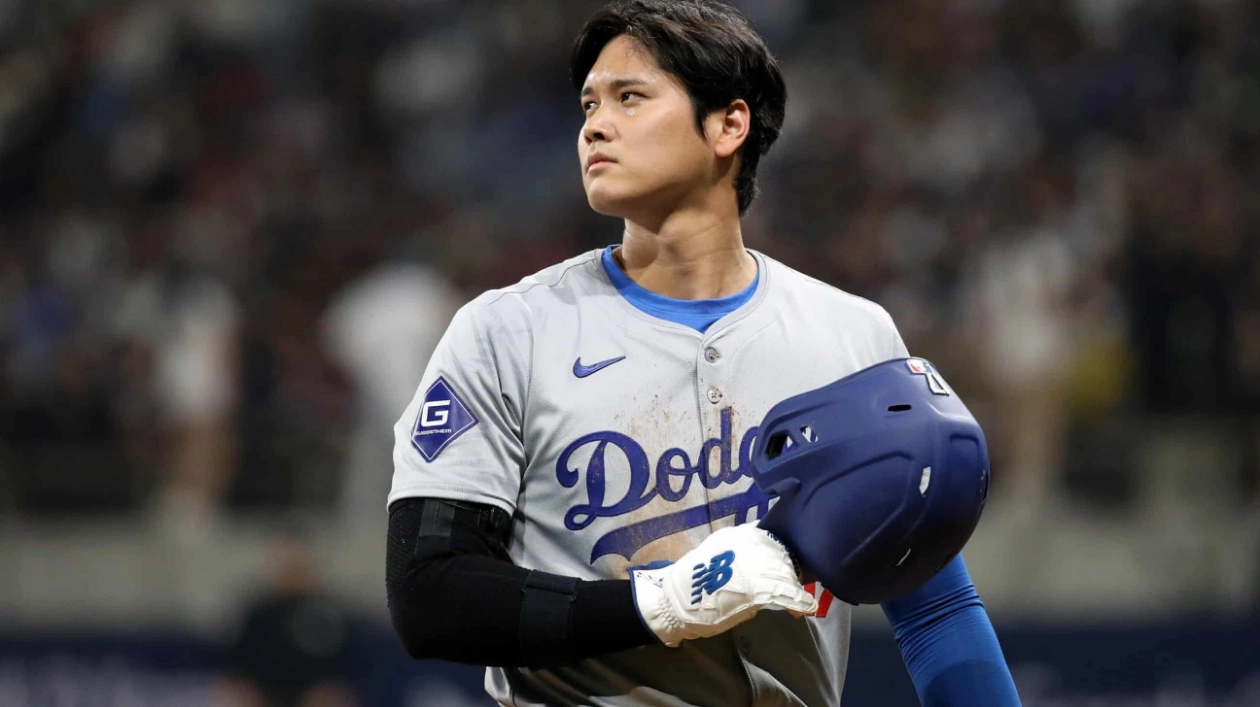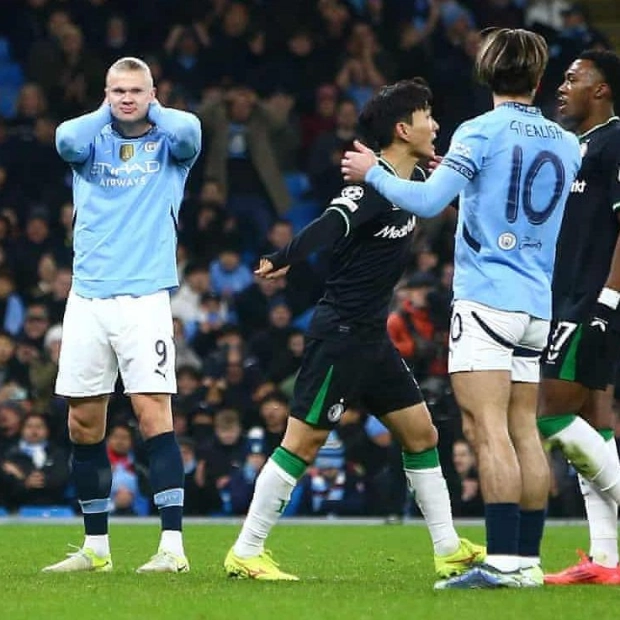It’s the final week of the Los Angeles Dodgers’ regular season. The San Diego Padres are in town, and a win tonight at Dodger Stadium over their Interstate 5 rivals would secure their 11th NL West division title in 12 years. The excitement is palpable, even hours before the gates open to the public. The clubhouse is tense: at the end of a season marred by injuries, the chance to earn a first-round bye and bypass the wild-card round could be crucial to their World Series aspirations. A tall, floppy-haired man enters the room, noticeably more serene than those around him, carrying a soft smile and a steaming cup of tea, and sits down at his locker. He is remarkably calm. One would never guess that he’s a history-making global phenomenon, set to make his first postseason appearance since joining Major League Baseball six years ago with the crosstown Angels. But Shohei Ohtani is not your average superstar.
At 30, Ohtani’s astonishing statistical feats speak for themselves, though they are hard to comprehend. Even in a season when his unprecedented two-way skillset was sidelined due to rehab from a second major elbow surgery, Ohtani found new ways to rewrite baseball’s record books. Just days ago, he became the first player in major league history to achieve 50 home runs and 50 stolen bases in a single campaign. By week’s end, he will have finished the regular season leading the National League in homers (54) and runs batted in (130), with a batting average (.310) second only to San Diego’s Luis Arráez (.314), narrowly missing the NL’s first Triple Crown since Joe Medwick in 1937. The staggering numbers continue: 134 runs scored, 411 total bases, a .646 slugging percentage, and an OPS over 1.000.
Ohtani’s first season under a record-breaking $700m, 10-year contract with the Dodgers has been worth every penny, leading the team to the best record in the majors despite numerous injuries. But those closest to him say it’s Ohtani’s demeanor off the field that truly sets him apart. “The way he carries himself, he knows there’s a lot of attention on him, and you wouldn’t even know it,” says third base coach Dino Ebel, who worked with Ohtani in his first year with the Angels before reuniting with him this spring. Ebel’s face lights up when discussing Ohtani, echoing sentiments shared by many on the team. The word “humble” comes up repeatedly. Ohtani just wants to be one of the guys.
Despite breaking records with stunning regularity, Ohtani, who speaks only Japanese during media availabilities, has cultivated a celebrity that transcends baseball. He’s handsome in a boyish, wholesome way. His impeccably trained Dutch Kooikerhondje named Decoy threw out the first pitch before an August game. The Los Angeles City Council declared every 17th of May Shohei Ohtani Day for the duration of his Dodger career. He’s a perfect modern superstar, almost as if custom-made to sell baseball jerseys. His presence has drawn a slew of Japanese sponsors to the Dodgers, boosting attendance for both road games and ballpark tours hosted by Japanese-speaking guides.
Perhaps for these reasons, many who believed Ohtani’s squeaky clean public image was too good to be true were relieved when a potential scandal arose during spring training. Ohtani found himself at the center of a theft and gambling scandal involving his close friend and longtime interpreter. But the truth was disappointingly innocuous. According to a federal investigation, Ohtani was the victim of fraud by one of his most trusted confidants, who was charged with stealing $16m to pay illegal gambling debts. Such an experience might have derailed other players, especially those under the pressure of a $700m contract and hailed as the savior of a sport in danger of becoming outdated. But not Ohtani. Could it be that this GOAT candidate is genuinely nice, funny, and normal?
It’s likely a testament to both Ohtani’s greatness and remarkable composure that he bounced back from a potentially explosive scandal without it defining his season. Ohtani’s calm and respectful nature may be partly due to Japanese culture, but his ease and joviality are uncommon for a competitor of his caliber. “He’s a little kid in a grown man’s body,” says Dodgers third baseman Max Muncy. “He doesn’t like to take things too seriously, he likes to have fun. He’s always smiling, always trying to joke around.” Teoscar Hernández, the Dodgers left fielder, agrees, describing Ohtani as fun and a good guy, despite his quiet and serious public image.
Ebel notes that Ohtani’s meticulous preparation habits are evident: “When he’s inside [the clubhouse], you see Shohei. When he comes out [to the field], it’s more of like, to me, I’m focused now, this is my job.” It’s not uncommon for stars to have on- and off-field personas, but remaining so grounded and easygoing behind the scenes amid international megastardom is rare. Ohtani has been a household name in Japan since his days at Hanamaki Higashi High School, where he made headlines by throwing a then-record 160 km/h (99 mph) fastball as an 18-year-old at the Summer Koshien. His profile climbed during his brilliant stint with Hokkaido Nippon-Ham Fighters, where he won a championship in 2016 before breaking into MLB with the Angels.
Shortstop Miguel Rojas was surprised by Ohtani’s down-to-earth nature given the immense hype around him. “Definitely, 100%,” he says. “Because I’ve played with other stars in the game that are different, and they’re needy. But to me, this place, for Shohei, is kind of a getaway from a lot of things.” Rojas found Ohtani “normal and natural” upon arrival in Los Angeles, always laughing and interested in getting to know his teammates.
Longtime Dodgers manager Dave Roberts describes Ohtani as “workmanlike,” respectful, humble, and treating everyone the same. “Honestly,” Roberts says, “every day, and in every interaction, he’s very present and engaging.” As the Dodgers prepare for their postseason opener against the Padres, Roberts appreciates Ohtani’s enthusiasm and excitement for his long-awaited debut on baseball’s biggest stage. “I think the thing I’m seeing with Shohei, is this is all new to him. And this is something, you could argue, he’s waited his whole life for: to play in the postseason in the big leagues,” Roberts says. “So you see his focus, his excitement, and his joy, and his energy. And that’s what I want from every single guy, whether they’ve played in 50 playoff games or haven’t played in a playoff game yet. I think that’s part of the recipe for success.”
In recounting anecdotes about Ohtani, like Hernández mentioning they swap stories about their native countries, it’s hard to fathom that they’re describing one of the most famous athletes on the planet. Ebel believes that’s the real Shohei: “That’s who he is. Really, deep down, someone who cares. And he wants to just be Shohei Ohtani the person.”






